- Home
- Stephen R. Donaldson
This Day All Gods Die Page 2
This Day All Gods Die Read online
Page 2
She sucked on her nic. “What’s to understand? Isn’t that what it all hinges on?”
“Not all,” he countered with a shake of his head. “But enough.” He knew the truth: whatever Lane learned wouldn’t change it. Nevertheless the proof he wished to give Warden Dios depended heavily on what Lane could discover.
“In any case,” he added, “these will be of interest.”
Casually, almost covertly, as if he didn’t wish to be seen, he slipped Imposs/Alt’s clearance badge and id tag into Lane’s pocket.
She identified them with her fingers, nodded decisively. “I’m sure they will.”
The sled was ready to go. Lane moved to accompany it. Despite the nature of the emergency, however, and his own desires, he called her back. Camouflaging his seriousness with his peculiar sense of humor, he told her that he wished to see her results “relatively instantaneously. Engage your gap drive, Lane. Defy time if you must.”
He wanted her findings before Warden summoned him.
She replied with a snort of smoke, “Don’t I always?”
He wheezed a laugh. “You do. Indeed you do.”
He waited until she and her sled had left the dock before shifting himself into motion.
By then he’d already begun to wonder how much longer Warden would delay.
More than an hour passed before a call from the director of the UMCP reached Hashi, instructing him to present himself immediately to one of Warden’s private offices.
Hashi hadn’t wasted the time. First he’d issued a number of Red Priority—“screaming red,” as it was sometimes called—security locks: one for every communications channel and computer that belonged or connected to Anodyne Systems, the UMC subsidiary which manufactured SOD-CMOS chips; one for the UMCP’s own personnel files; and one for each of Holt Fasner’s Home Office personnel, payroll, and Security Liaison computers. A screaming red security lock didn’t prevent anyone else from looking at electronic files or using communications linkups; but it blocked changes of any kind to those files, or to any transmission logs and records. At the same time it warned DA that changes had been attempted, and traced the codes and routing of the attempt backward.
He was morally certain that the Dragon’s HO techs could disable or deactivate a Red Priority security lock, no matter how loudly it screamed. At the same time he was quite sure that this would not be done, first, because Holt Fasner would hardly imagine that crucial records were in any danger of exposure, second, because Holt would believe that any embarrassment which might arise from his files could be quashed through Warden Dios, and third, because as a matter of policy the Dragon liked to preserve an illusion of openness and honesty. Rather than resistance Hashi expected passive acceptance: another illusion.
An illusion which would reveal itself as murderous fury against Hashi himself when the UMC CEO determined that Hashi no longer represented a threat.
This prospect didn’t trouble Hashi. He could say with considerable accuracy that he did not fear the Dragon in any ordinary sense. The possibility of intellectual inadequacy gave him far more distress than a merely physical threat.
When his security locks were in place, he used his authority under the provisions of Red Priority to compile the most complete dossiers which Data Storage, joined by microwave downlinks to GCES Security and Anodyne Systems, could provide on both Nathan Alt and Clay Imposs.
Warden’s summons found him just as he was finishing.
More than an hour since the shuttle had docked: several hours since the kaze’s blast. Apparently Warden hadn’t been taken by surprise to any meaningful extent.
That was good and bad; better and worse. The delay had allowed Hashi to complete his immediate research. On the other hand, a longer delay might have given Lane time to produce the results Hashi craved.
Despite the plain urgency of the summons—and the necessity of obedience—Hashi took the time to call her.
Her voice over the intercom was brusque and focused; deep in concentration. “Make it quick. I’m busy.”
Hashi couldn’t restrain himself: his personal imp of perversity made him say, “Too busy to talk to me? Lane, I’m crushed.”
She let out a sigh that sounded like smoke. “If you want me to work fast, I have to be careful. If you want me to work faster than the speed of light, I have to be more careful than God.”
He relented. “I understand perfectly.” Above all he valued Lane for her meticulousness. “Nevertheless I must appear before Warden Dios in a matter of moments. The time is apt for results. He will certainly desire results from me.”
“Then let’s not waste each other’s time. Here’s what I have so far.
“The id tag and clearance badge were easy.” She didn’t need to organize her thoughts. Hashi suspected that she permitted herself no disorganized thoughts. “They’re legit. I mean Clay Imposs is—or maybe was—a real GCES security guard with a good record. He’s been with them for years. The tag and badge say they’re his. But the body isn’t.
“You were right, it’s Nathan Alt. Gene scan matches exactly.
“So how did he get through his own Security?” She asked Hashi’s next question for him. “Right after that first kaze attacked Captain Vertigus, GCES Security started using retinal scans to confirm id. That should have stopped Alt cold.
“The answer is, this is a new id tag. Made for the job. It says it identifies Clay Imposs, but the retinal signature and the rest of the physical id belong to Alt.”
“Is that possible?” Hashi inquired. He knew it was.
“Sure. It worked because the physical id was generated by the same code engine that drove Imposs’ clearances. Everything looked legit on the surface. GCES Security didn’t know they had to run a full playback from the SOD-CMOS chips and compare it to Imposs’ original data to catch the switch. Hell, Hashi, we aren’t doing that here. It would take hours to clear anybody.”
Sadly, that was true. Indeed, the only reason GCES—or UMCPHQ—Security functioned at all was that the expertise needed to circumvent it was so specialized; and so closely guarded.
“Are you performing this playback? I require evidence.”
“One of my techs is.”
“And—” Hashi prompted her.
“We haven’t found anything yet.”
“Have you encountered any patches, or other signs of tampering?”
As Hashi had told Koina before the extraordinary session, the code-strings Lane had extracted from the credentials of Godsen’s killer were current as well as correct. If that code engine had been patched or altered—lawfully or otherwise, by GCES Security, Anodyne Systems, or anyone else—the change would have been apparent. Such adjustments transformed source-code as much as mutagens transformed human RNA.
But only older code required patching.
Lane restrained impatience poorly. “Not yet.”
“Very well.” He let that question go. “And the code engine itself—?” he probed.
“It’s valid,” she returned at once. “Current and correct. Which means exactly what you think it means.
“But if you want confirmation,” she continued without pausing, “the source-code strings we’ve picked up from the id of the kaze who killed Godsen are a perfect match.”
Hashi nodded to himself. “Confirmation is always welcome. However, this is hardly a surprise.”
“No,” Lane acknowledged.
He cast a worried glance at his chronometer, then asked, “Have you gleaned any other data?”
“That’s what I’m working on,” she retorted. “The body.”
As she spoke, he heard a subtle shift in her tone; a change of intensity. So far the results she’d given him had been relatively routine, despite their importance: any of the techs in her department could have supplied them. But now she sounded more personally engaged; perhaps excited. At once he became convinced that she was on the track of something vital.
“But I can tell you right now,” she went on, “we aren
’t going to find a detonator.
“The bomb has to be shielded in the body. Otherwise Security would catch it. And you know what that kind of shielding is like.” Hashi did know. Angus Thermopyle’s body was full of it. “It has to appear organic in order to pass scan. On top of that, it has to reflect back what scan expects to see. Unfortunately—for us—any shield contains the blast when the bomb goes off. Maybe only for a millisecond or two, but that’s enough to throw some of the force back onto the bomb itself. And the detonator. On a molecular level, I’ll be able to find all the pieces you want. But I won’t be able to reconstruct the device those pieces came from.
“So I’m concentrating on biochemistry.”
Her voice conveyed an almost subliminal frisson, like a distant electrostatic discharge. Despite the numbers ticking away on his chronometer, he listened harder.
“His blood is a real witch’s brew. Which is exactly what you would expect if he was in a state of drug-induced hypnosis. I haven’t had time to identify even half the chemicals his body shouldn’t have had in it.” She paused to emphasize what followed. “But there’s one detail that looks a little strange. Or a little stranger than the rest of it.”
“Tell me,” Hashi put in as if he thought he could hurry her; as if he didn’t know that she was already moving as fast as she could without stumbling into disorganization.
Instead of hurrying, she began to speak a bit more slowly, articulating each word with deliberate precision.
“There’s a coenzyme spike in his blood spectrum. I mean a major spike. Of course, it’s a coenzyme. It’s inert. And it isn’t even remotely natural. But it combines with some natural human apoenzymes to produce an artificial holoenzyme, and that one is active. It bears some interesting resemblances to pseudo-amylase, which is one of the enzymes we use to produce shielding in cyborgs, but there are significant differences, too.”
Involuntarily Hashi drummed his fingers on his desk. He needed to answer Warden’s summons. “Lane, please make your point. I am not in good odor with our esteemed director. This delay while we talk will doubtless vex him.”
“I’m trying, damn it,” she snapped. “Nobody but you ever gets to think around here.”
He swallowed a burst of ire. He had called her before she was ready to report. Her findings were partial or unclear. Naturally she wished to express them cautiously. He would gain nothing by reproaching her.
“If there were more resemblances,” she explained stiffly, “I would probably assume this particular coenzyme is there because of the shields. But it wouldn’t work well for that. The differences are too significant.”
Again she paused. In another moment or two, Hashi thought, he would have no choice but to shout at her.
More slowly than ever, she went on, “If I were asked to come up with a use for the holoenzyme this coenzyme creates, I might say it would make a good chemical trigger. Release it into the bloodstream, and one or two heartbeats later you get a big bang. Like an orgasm so intense it kills you.”
Without transition his irritation vanished. Lane Harbinger, he hummed to himself, you are a marvel. Is it any wonder that I endure your eccentricities?
Almost singing his excitement and pleasure, he said, “Check his teeth, Lane.”
Where could a coenzyme be concealed so that a man in a state of drug-induced hypnosis would be able to ingest it on some preconditioned signal? Where else but in his mouth? And absorption into the bloodstream would be slower. Ten or fifteen seconds at least. Safer for the man who gave the signal.
“What’s left of them,” she returned. “I’m already working on it.”
In a glow of perverse gallantry, he answered, “Then please do not allow me to interrupt you. Perhaps when your efforts are complete you will let me persuade you to marry me.”
So that he wouldn’t hear her laughing in scorn, he silenced his intercom.
No doubt she could never prove the conclusions he drew. When her research was complete she would probably be able to demonstrate that this particular holoenzyme would serve well as a chemical trigger. Sadly, logic would preclude her from concluding that this holoenzyme did serve in that fashion.
Nevertheless what she had learned was enough for his immediate purposes.
Gathering his rumpled labcoat around him, Hashi Lebwohl left his office and walked as quickly as his untied shoes allowed to his meeting with Warden Dios.
CIRO
Vector had told him he was cured. Mikka told him over and over again, holding him in her arms and rocking him as if he were a baby.
Ciro knew better. The walls of his doom had closed around him like the claustrophobia of Mikka’s embrace. His bunk was a coffin. Of course he knew better.
Sorus Chatelaine had injected a mutagen into his veins: he understood that in the genetic programming of his DNA; understood it more profoundly than anything anyone could have said to him. No mere words could outweigh his cellular comprehension of the way he’d been betrayed.
Somehow Morn had lured or tricked him into revealing what had happened. Now everyone knew. By the hour his doom became more certain, not less.
Of course she’d asked Vector for help. Why not? Why should she grant Ciro the simple decency of facing his shame and horror alone? No one had ever taken him that seriously.
And when the dilemma had been explained to him, Vector had proposed giving Ciro some of Nick’s antimutagen. Vector had said, The drug is essentially a genetically engineered microbe that acts as a binder. It attaches itself to the nucleotides of the mutagen, renders them inert. Then they’re both flushed out of the body as waste. As he spoke, the man who’d once been Ciro’s mentor and friend had sounded confident and calm, inhumanly sure of himself.
But his reassurances meant nothing. Ciro couldn’t hear them through Sorus Chatelaine’s threats.
Her words were infinitely stronger.
The mutagen stays in you, it stays alive, it works its way into every cell and wraps itself around your DNA strings, but it doesn’t change you as long as you have this other drug in your system. The drug she’d offered him in exchange for his compliance. How long the delay lasts depends on how much of this other drug you have in you—or how often you get it. You can stay human until you’re cut off from your supply. After that you’re an Amnioni.
That’s why I serve them, Ciro. If I don’t they’ll cut me off from the antidote.
And that’s why you’re going to serve me.
When she’d injected him—while Milos Taverner had held him—he’d grasped that she was telling him the simple truth. He would stay human as long as his supply of the other drug lasted.
He knew what he had to do.
She wanted him to sabotage Trumpet’s drives. Both of them. That was her price for keeping him human.
He would do it if he ever got the chance.
Kill everyone aboard; murder them—
Even Mikka.
Especially Mikka. The more she knew about her danger, the more stubborn her loyalty to Trumpet’s people became. She stood by them despite the fact that her interference was going to kill him.
She didn’t understand. How could she? She was stronger than he was. They were all stronger. Instead of leaving him alone—hadn’t he begged her to leave him alone?—she’d daunted him with her strength; smothered him with her devotion. She’d prevented and prevented him. Gripped him in her arms to comfort herself. And all the time his doom had continued counting down; approaching ruin.
Here, Vector had commanded when he’d returned from examining Ciro’s blood in sickbay. This is a dose of Nick’s antimutagen. He’d thrust a capsule at Ciro. Take it. Then come with me. I want to run a series of blood tests in sickbay. We’ll be able to see it working. That way you’ll know you’re safe.
Ciro knew better. He’d always known better. But Mikka and Vector were too strong for him.
While Trumpet ran a relatively quiet part of the swarm, Mikka had compelled him to sickbay. At her urging, he’d looked at the
results of Vector’s blood tests; seen the nucleotide profiles shifting until they reached the range designated “human normal.” He’d listlessly watched a video display which purported to give a real-time picture of the mutagen immunity drug binding itself to Amnion RNA strings and carrying them away.
Vector clearly believed the results. Mikka believed them.
Beyond question Ciro knew better.
Sabotage the drives. Both of them. You’ve been trained in engineering. You know how to do it. You make sure Trumpet can’t outrun me. She’s finished if she can’t run.
Back in his cabin, imprisoned by his sister, he continued waiting.
Twelve hours. Sorus Chatelaine had said, If I don’t have what I want in twelve hours, you’re on your own. That was all. And only a portion of it remained. Whenever he was due for another capsule, he made Mikka release him so that he could go to the san: he swallowed his next dose of the temporary antidote privately. He was strong enough for that. But the dwindling store in his vial reminded him harshly that he didn’t have much time left.
Was it already too late? He couldn’t tell. Without warning Trumpet went into battle, and he couldn’t have left his g-sheath no matter how much he wanted or needed to obey. The whole ship was filled with the frying sound of matter cannon, the metallic clangor of impacts and stress. Acceleration g slammed the gap scout in one direction after another. Any fight in an asteroid swarm was a navigational nightmare. Judging by the sounds and pressures, this one was even worse than that. The intense, inexplicable alternation of quiet and violence gave the impression that Trumpet was fighting more than one opponent; in more than one part of the swarm.
Voices over the intercom offered partial explanations, but Ciro paid no attention to them. They were wasted on him unless they forced Mikka to go away.
Then the ship hit g so extreme that he blanked out. He no longer knew what he needed, or why it mattered. His mind was filled with death and effacement; the last, absolute relief.

 The Illearth War
The Illearth War Last Chronicles of Thomas Covenant 02 - Fatal Revenant
Last Chronicles of Thomas Covenant 02 - Fatal Revenant Lord Foul's Bane
Lord Foul's Bane The Gap Into Ruin: This Day All Gods Die
The Gap Into Ruin: This Day All Gods Die White Gold Wielder
White Gold Wielder Fatal Revenant
Fatal Revenant The Mirror of Her Dreams
The Mirror of Her Dreams Against All Things Ending
Against All Things Ending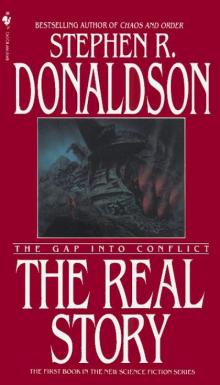 The Real Story: The Gap Into Conflict
The Real Story: The Gap Into Conflict The Power That Preserves
The Power That Preserves Seventh Decimate
Seventh Decimate The Gap Into Power: A Dark and Hungry God Arises
The Gap Into Power: A Dark and Hungry God Arises A Man Rides Through
A Man Rides Through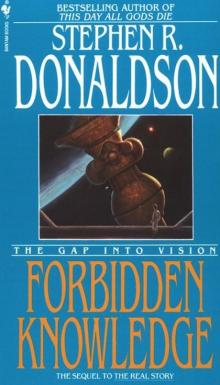 The Gap Into Vision: Forbidden Knowledge
The Gap Into Vision: Forbidden Knowledge The King's Justice: Two Novellas
The King's Justice: Two Novellas The Wounded Land
The Wounded Land The Runes of the Earth
The Runes of the Earth Mordant's Need
Mordant's Need The One Tree
The One Tree Gilden-Fire
Gilden-Fire Reave the Just and Other Tales
Reave the Just and Other Tales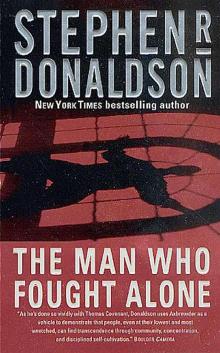 The Man Who Fought Alone
The Man Who Fought Alone The Last Dark
The Last Dark The Man Who Tried to Get Away
The Man Who Tried to Get Away Thomas Covenant 02: The Illearth War
Thomas Covenant 02: The Illearth War A Dark and Hungry God Arises
A Dark and Hungry God Arises The One Tree t2cotc-2
The One Tree t2cotc-2 Lord Foul's Bane cotc-1
Lord Foul's Bane cotc-1 The Illearth War t1cotc-2
The Illearth War t1cotc-2 The Runes of the Earth: The Last Chronicles of Thomas Covenant - Book One
The Runes of the Earth: The Last Chronicles of Thomas Covenant - Book One The King's Justice
The King's Justice White Gold Wielder t2cotc-3
White Gold Wielder t2cotc-3 The Power That Preserves t1cotc-3
The Power That Preserves t1cotc-3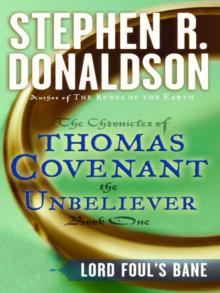 Thomas Covenant 01: Lord Foul's Bane
Thomas Covenant 01: Lord Foul's Bane Chaos and Order: The Gap Into Madness
Chaos and Order: The Gap Into Madness Daughter of Regals
Daughter of Regals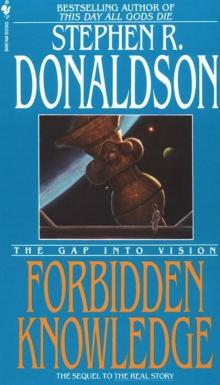 Forbidden Knowledge: The Gap Into Vision
Forbidden Knowledge: The Gap Into Vision Fatal Revenant t3cotc-2
Fatal Revenant t3cotc-2 The Runes of the Earth t3cotc-1
The Runes of the Earth t3cotc-1 Thomas Covenant 03: Power That Preserves
Thomas Covenant 03: Power That Preserves This Day all Gods Die: The Gap into Ruin
This Day all Gods Die: The Gap into Ruin The Wounded Land t2cotc-1
The Wounded Land t2cotc-1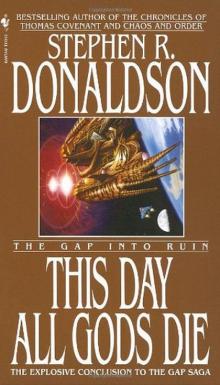 This Day All Gods Die
This Day All Gods Die One Tree
One Tree